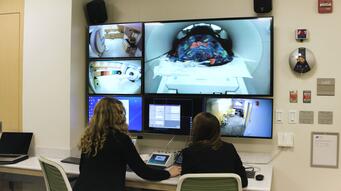Technology
Shaping the future with technology
We are leveraging technology to build a more accessible, inclusive, and connected Yale. We seek creative solutions for using space on campus, building the shared economy, and enhancing mobility.
Yale’s Efforts
- Yale has made remarkable progress reducing server energy use, working with sustainable vendors, and streamlining on-campus IT systems.
- The University continues to provide the Yale community with new and more advanced computing solutions such as cloud-based virtual desktops, telework solutions and meeting the needs of employees and students with disabilities.
What You Can Do
- Explore Yale’s telecommuting resources.
- Take advantage of Yale’s teleconferencing services to make meetings easier and more efficient.
Our Objectives and Goals
Foster Connectivity through Networks
Develop and implement multidisciplinary technological solutions that foster sustainability and connectivity through local, regional, and global networks
The growth of AI holds enormous potential for developing solutions to climate change, even as it accelerates energy use and introduces new environmental challenges. With that in mind, in 2014, Yale announced its membership in an intercollegiate center known as the Massachusetts Green High Performance Computing Center (MGHPCC) consortium, which operates a state-of-theart green data center in Holyoke, Massachusetts that is dedicated to supporting computationally intensive research. At the same time, Yale introduced a new, more energyefficient GPT for the university’s Clarity platform, giving users access to the full capabilities of generative AI using a language model that consumes less energy than standard ChatGPT tools.
Sustainable Technology Network
By 2018, establish an initiative to promote technology-based sharing economy concepts.
This objective was originally supported by the Sustainable Technology Network goal, which has since evolved to become part of our overall technology goals.
Sustainable IT Standards
Lead the technology industry by creating replicable sustainability standards related to energy, materials, human well-being, and transportation
Sustainable IT Standards
By 2025, define new sustainability standards for institutional information technology.
While new sustainability standards were not formally developed, Yale ITS is currently involved in myriad projects that bolster sustainability including supporting Yale’s museums and collections departments with data-driven environmental monitoring systems, remediating critical IT infrastructure to bolster resilience, and expanding virtualized computing on cloud-hosted platforms. Yale’s IT sustainability footprint has also been enhanced through wiring improvements for new building projects and mapping manholes on campus with GIS technology.
Telework
By 2020, increase teleworking at Yale by 25% to reduce travel and transportation emissions.
This goal was achieved in 2020 when the pandemic prompted the switch to remote work, but we continue to track the usage of teleconferencing tools. In 2025, there was a 202 percent increase in use of teleconferencing tools above 2018 levels. As we envision the future of hybrid work, we are leveraging technology to cut emissions while actively rethinking space use, advancing sustainable transit options, and reimagining parking to support a lower-carbon campus.



